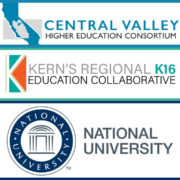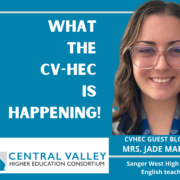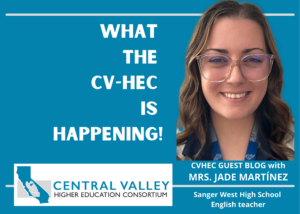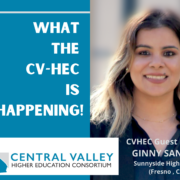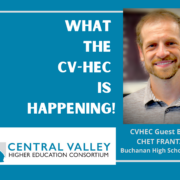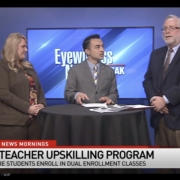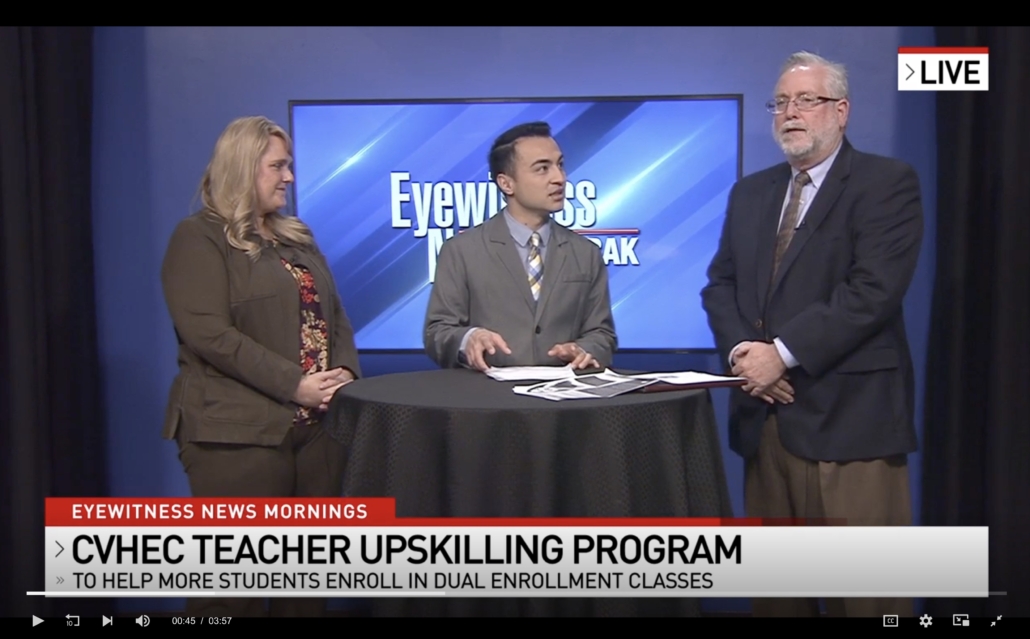CVHEC Blog: Master’s Upskill Program Success Story
This month’s “What The CV-HEC Is Happening” guest blog is presented by Mrs. Jade Martinez, an English teacher at Sanger West High School in Sunnyside (east Fresno) who earned a master’s degree from National University in December 2022 through CVHEC’s Master’s Upskilling Program. Jade earned her bachelor’s degree at Fresno State in 2020 and began her teaching career at SWHS that fall. Here, she shares her experience fulfilling an academic dream of obtaining a Master’s that has led to teaching dual enrollment courses this fall, the primary objective of the Master’s Upskill Program.
Sanger teacher recounts road to a post-bac degree
and her first dual enrollment class
BY JADE MARTÍNEZ
Dual Enrollment English Teacher
Sanger West High School
I went back to school when my son was two years old and my daughter was six months old, starting at Reedley College. I worked nearly full-time and was a full-time student as well, inspired to be a life-long learner ready for the demands of teaching.
I knew that I wished to complete my Master’s degree in English but soon realized that I would need an additional year or two of prerequisite courses before I could do it. The idea was placed on the backburner, as I needed to focus on becoming a teacher and providing for my family after nearly eight years of building debt.
When I was in my final student-teaching at Sanger West in 2020, my master teacher became our English Language Development curriculum support provider (CSP) so I interviewed for his vacated position. Because of his promotion, I continued working with my students for the whole year rather than one semester. Within a few months of becoming a teacher, I learned about CVHEC Master’s Upskilling Program being offered through Sanger Unified in partnership with National University that would qualify high school teachers to teach dual enrollment courses at their high school campus.
An additional plus was that there would be a specialization in rhetoric attached to this degree, which matched my undergraduate emphasis on composition and rhetoric. I was instantly interested because I already qualified without the additional prerequisites but I was also hesitant since I was still considered an intern with an emergency credential at the time.
After consulting with my mentor and professors, I was ready to take on the challenge.
I began the upskilling program while I worked on induction simultaneously, spending nearly every hour away from work completing assignments for each program. Many mornings I woke up early to complete work before my kids were awake. When I had free time at work, I read various texts for classes and completed mentor logs, professional development, and my individual learning plan. Once I was home, I could afford to take a short break for an hour and had to begin work once more. There were many times when my kids would ask me “Are you done with homework yet, mom?” and unfortunately, I would not be finished until long after they went to sleep for the evening.
Once again, the mom-guilt set in as I tried to see the positives that this program would bring, trying to avoid the voice in my head telling me that I am not a good mother because of all the years of sacrificing time together so that we could be financially stable enough to not struggle anymore. Many days I forced myself to stay strong and keep pushing, knowing that with each completed class I would be closer to the end of my education journey for a while.
I received the news that my thesis was approved right before my 30th birthday. I always told myself that I would graduate college by the time I turned 30 yet I went one step further and completed my master’s as well as having my dream job being a teacher. All of the sacrifices and long hours had finally paid off once that piece of paper was framed and hung on my classroom wall.
A world of opportunities opened in front of me, as I soon became the leader for my professional learning team (PLT) and most recently I was asked to begin the dual enrollment program for English 1A at Sanger West High School.
In August, I received confirmation for that assignment and now this fall I am teaching the dual enrollment course thus achieving the objective CVHEC set with its leadership in this area not only for both high school student advancement to degree or certificate attainment but also for high school teachers seeking professional development.
In just one month, I am enjoying the freedom that teaching dual enrollment provides. Even the challenges we face — that any program in its infancy may experience — are providing a valuable learning episode of its own. But the overall sense of accomplishment that comes from knowing we are forging a path that ultimately helps our students is the motivating inspiration.
And I know that my degree affords many other opportunities such as editing, freelance writing or even becoming a professor at the community college level. I have progressed two unit levels on the payscale and also receive a monthly stipend just for having my postbac degree.
At last, I can fully provide for my family without hardship or struggle!
WHAT THE CV-HEC IS HAPPENING GUEST BLOG (JAN. 2023): Master’s Upskilling
This month’s What The CV-HEC Is Happening guest blog is presented by Ginny Sandhu, an English teacher at Sunnyside High School in Fresno who earned a master’s degree in December, 2021 through CVHEC’s Master’s Upskilling Program. She earned her bachelor’s degree at Fresno State in 2008 (credential 2009) and has been teaching for 13 years. Here Ginny shares the value of the upskilling program and how it will benefit not just her personal and professional advancement but also her students through dual enrollment.
Master’s Upskilling Program leads to
dual enrollment courses; student benefit
BY GINNY SANDHU
Sunnyside High School – Fresno CA
My latest academic journey – obtaining my Master of Arts last summer – officially began at National University in January 2021. But as I reflect on the years past, it really started long before that.
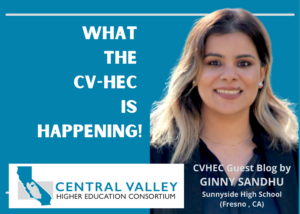 Having taught writing-centered courses like AP Language and Composition and Expository Reading and Writing for many years positioned me perfectly to want to improve my art for a very important reason — my students.
Having taught writing-centered courses like AP Language and Composition and Expository Reading and Writing for many years positioned me perfectly to want to improve my art for a very important reason — my students.
I wanted to pursue a graduate program that helped me become a better writing instructor for students who take high stakes courses like the AP courses I taught. So much of who I was (am) as a professional at the time aligned so well with the courses offered in the program (Master’s of English, specialization in Rhetoric) that once I learned about the opportunity, I happily enrolled immediately.
From the start, the program had many entities that were involved to make the initiative a success for its candidates — the Central Valley Higher Education Consortium, Fresno Unified School District, Fresno County Office of Education and National University — all supported this enormous effort to help individuals like me achieve academic goals without any financial burden.
Once the courses began, I was assigned a wonderful mentor from Fresno City College, a tenured professor, who supported me with various facets of the program. Some of the concerns he assisted me with were academic while others were career-related. I was able to get feedback on major essays and projects and, any time I felt like I was reaching a point of burnout, his wisdom, knowledge, and experience guided me accordingly.
In my courses, I learned about ancient and modern rhetoric. In one class, I was able to develop a revision method using various research-based approaches that we studied in class.
In another class, we delved into education and technology and how the world of writing is changing because of all the technology that is conveniently available to a modern-day student. We even took a course on Noir as a genre and learned about Film Noir and Femme Fatales. Romanticism came close to being one of my favorite courses, but History of Rhetoric took the trophy for being one of the most informative and enjoyable courses for me. I appreciated learning more about Emerson who believed in the importance of receptivity as we interact with the world, with nature, and believed in the complete submission to the sublime experience as a way to a spiritual clearing.
But it was the History of Rhetoric course that took us through the most beautiful journey starting first with the Greeks then the Romans, and onwards to more modern rhetoricians. The course allowed us to see how rhetoric has expanded over the centuries to include broader concerns of epistemology, social construction, ideology and the study and use of symbol systems. It also allowed me to see the power of language and the many facets of rhetoric as an art form. I came to understand the hegemonic power of political structures in creating metanarratives through language that strive for homogenization of people—thereby reducing people to a single story. This led me to study Plato, Cicero, Quintilian, Lyotard, Nietzsche, Goddard, Said, Sartre, Hegel, Freud, and numerous other philosophers who have shed light on the power structures that are constructed through language.
The most gratifying moment in the program for me was my Capstone project in which I rhetorically analyzed Frantz Fanon’s Black Skin, White Masks. While the labor was long and arduous, I felt well-supported by the faculty in charge and the two months allotted to just writing my thesis.
My hope was to understand how language as a power tool operates in our world and Fanon’s psychoanalytic approach to racism and his characterization of psychic violence through his radical stance against established scholarship allowed me to see that it is indeed possible to challenge oppressive systems and language gives you that ability. Personally, this program gave me the tools to deconstruct language around racial conflicts, such as the ones in Punjab, and the Black Lives Matter movement in the United States.
Currently, I am teaching Dual Enrollment English 1A at Sunnyside High School in Fresno. Like the master’s program, I was fortunate to have been assigned a mentor again, and lucky for me, I got to work with the same mentor as my MA program: I gladly call Jeff Tannen a friend now.
I will forever be grateful for the opportunity to get a master’s degree with so much support built around me — and all of this without any financial investment of my own and entirely online, allowing me the flexibility I needed to sustain a full-time teaching position and be there for my family.
WHAT THE CV-HEC IS HAPPENING GUEST BLOG (NOV. 2022): The Master’s Upskilling Program
Master’s Upskilling experience
was a game-changer
This month’s guest blog is presented by Chet Frantzich, an English teacher at Buchanan High School in Clovis who earned a master’s degree in June through CVHEC’s Master’s Upskilling Program. Chet earned his bachelor’s degree at Fresno State in 2010 (credential 2012) and has taught at BHS since 2018. He shares the value of the upskilling program and how it will benefit not just his personal and professional advancement but also his students through dual enrollment courses he plans to teach in the near future.
By Chet Frantzich
Buchanan High School
The Master’s Upskilling experience afforded me courtesy of the Central Valley Higher Education Consortium, National University and the Clovis Unified School District was a career altering one.
Not only did achieving my master’s in rhetoric open up pathways for me to teach dual enrollment courses and even courses at my local junior college, but it also impacted the way I teach. Graduating from the program has instilled in me a better sense of what my students need when it comes to functioning in college, yes, but also in life. 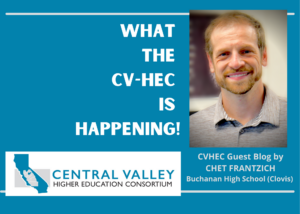 The program was a revelation regarding what truly matters in education and regarding how to teach the whole student.
The program was a revelation regarding what truly matters in education and regarding how to teach the whole student.
I knew going into the program that it would be demanding — not just the workload each class would require that would make it so, but also balancing teaching and extracurricular responsibilities. However, each class was so organized and each instructor so available and professional that it took hardly any time at all to fall into a kind of groove regarding the work. Before I knew it, the class was over, and hence, the program itself successfully completed.
Each class had a curriculum that was engaging and impactful, relevant to my cohort’s subject area, even to the point where I would read about a strategy or an idea on a Wednesday and apply that idea or enforce that strategy the very next week. It dawned on me early in the program that I was not just earning a postbaccalaureate degree; I was improving as a teacher day-by-day, week-by-week.
Here is an example of what made the program so navigable: from the outset of each class, we (each cohort member) knew exactly what the end goal was we were striving for. From week one on, we would engage with texts and perform activities and interact with one another and building ideas – one upon the other, never in isolation of each other – so that, come the final week of the class, a lot of the work we would have to do for our month’s final project has been completed.
Not only did this help me manage my time and make me feel like my work was consequential, but it also illuminated an idea: why don’t I do this with my students?
And so I did, almost right away. Not long after joining the cohort and being confronted with this realization, my students read a novel where I could show them the result we would be striving for before actually starting the book. This was not something foreign to me. What was new though, was the importance of revealing to people what they are doing, what the end result is, that way how they go about getting to that end destination is of the best quality possible.
The program elevated my teaching abilities in numerous ways, but understanding what my students needed to excel in their next stage of life was the chief way I improved. It is not that I did not know what they needed, but more so that I came to better understand how to get what they needed to them.
My mentor, Jeff Burdick, was a key piece in helping me understand how to help my students. His wisdom and experience in the college classroom revealed some things and affirmed others: that students need to be given a space to be creative, that they need to be shown tough love, that understanding how basic language works is essential to being a great communicator, that writing is the best way to teach people how to think.
Without the program, I think my grasp on those ideas would be decent, vague; graduating from the program, my grasp on those ideas is iron-like.
I cannot wait for the opportunity to teach dual enrollment classes. I have not been granted the chance to teach them yet, but when I do, I know I will be ready, and the Master’s program is a big reason why.
I do not think there is a topic or issue in the English classroom I cannot tackle, so expansive was the breadth of my experience earning my master’s. Going through the program is an experience I will never forget, and it is one I will forever be grateful for. There is no question that the program has made me a better, more well-rounded teacher, and it has inspired me to keep learning about my craft, that way my students get the best version of me year-to-year, month-to-month, week-to-week, day-to-day.
More specifically, I am confident they will find inspiration in the taking dual enrollment courses I hope to soon teach that will lay a foundation for a successful and meaningful higher education experience.
See Mr. Frantzich communicating with his student’s parents for Back to School Night 2021.
CVHEC IN THE NEWS: KBAK features Kern Master’s Upskill Program
CVHEC’s Kern Master’s Teacher Upskilling Pathway for English and Mathematics was featured on KBAK’s Eyewitness Mornings with host Tony Salazar interviewing project coordinator Tom Burke and Dr. Krista Herrera, director of the Kern K-16 Collaborative.
The program is currently recruiting South Valley math and English teachers for the cohorts to be presented next spring.
See: KBAK interview (Oct. 19, 2022).

